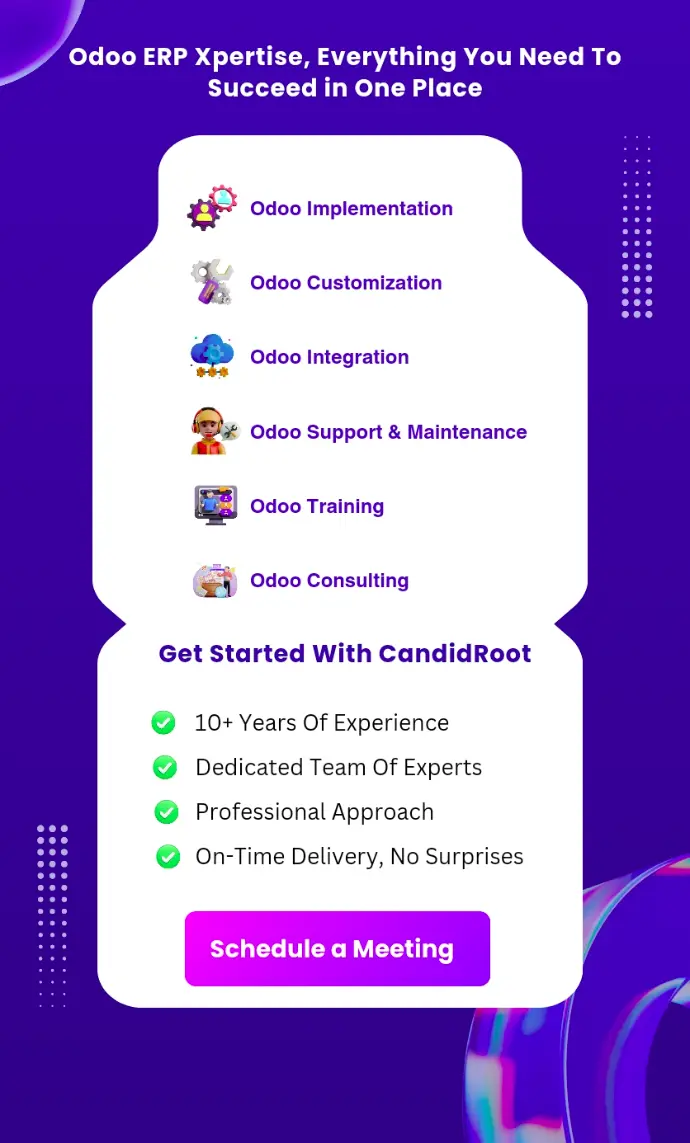Why Choose ERP System ?
Odoo is an OpenSource ERP system with low-cost implementation, but that doesn't mean that there is no added cost in implementation but there are many ways to improve using Odoo and similar ERP solutions.
Without proper utilization, the ERP system will not give proper ROI for your company. Let's not wasting much time and start with the ways to get the most out of the before and after ERP implementation scenario.
1. Choose an ERP system carefully which best suits for your business
A wrong choice of ERP system can quickly ruin the purpose of selection. Without the right ERP solution, the company is bound to lose tons of investment, time, stakeholders credit, and much more. A good ERP solution selection can change how the company focuses on ensuring that none of the above happens in the future.
For choosing the right ERP solution, requirement gathering and assessment should be done at the starting phase of ERP Implementation. It should also include both functional and technical requirement analysis along with future consideration into account.
2. Observer Total Cost of Ownership
To start ERP in any organization is a long-term project. And, it starts when the first implementation phase completes. Many organization doesn't take the full value of the property into account. The lack of understanding how the ERP will cost can bring down the whole purpose of ERP implementation. The TOC should include all aspects like internal resources, external resources, hardware, etc. for a better understanding.
3. Choose vendor/integration partners carefully
With proper ERP selection and Total Cost of Ownership out of the line, now it's a real time to choose partners carefully. Choosing the right ERP partner includes asking them to present a proper plan for the ERP implementation and ask about their work experience in ERP. A proper budget management is required to ensure no lapse in funds in future. According to the requirements, appropriate work documents/guidance, along with other plan elements needs to be done.
4. Customize ERP which is suitable as per your business needs.
Each and every business is unique and it has own requirements, some of these cater by default ERP system while some other requirements need to be customized based on specific requirements. In a business, Implementing out of box solution can lead to reduced user productivity, poor quality reporting and user obstruct with the intent to prove the ineffectiveness of the system.
5. Senior Management Plays an important Role
Senior management controls the internal resource. They can influence people and makes sure that no one is let out. The workers/staff will be more likely to oppose the ERP implementation because no one will go for changes and it is difficult to accept lifted role in the workplace. Senior management plays an important role in maintaining the staff spirit and help them confront the change management in the organization.
Also, non-support from senior management can lead to issues in the implementation as they play an important role in the implementation process.
6. Develop proper Roadmap
When planned, Complexities are better handled. For the purpose of ERP; it is necessary to have a strategy. Also, to make sure that the future looks bright, a road-map should be created. The road-map can help keep the stakeholders faith and enable everyone to handle the changing passage in a confident manner. A road-map is also ideal for efficient cost management and support builds a secure future for the business. A proper definition of functional and structural processes should be created during the process, and appropriate improvements should be made to the already implemented processes and features.
7. A mixed cross-functional team can smoother the process
To help smooth the implementation process, companies should set up a cross-functional implementation team. ERP is implemented on a large scale, across the departments. It is necessary to appoint a cross-functional team to ensure proper implementation and execution, The cross-functional team, i.e. individuals from the different department will make sure that their staff is well served and implemented without any bias or errors. The inputs can improve the overall quality of the implementation and ensure that the ERP is implemented successfully.
8. Go for ERP one module at a time (not all at Once)
Better approach for ERP implementation is to go for one module at a time. It means keep it as simple as possible and do incremental development, rather than a big-bang development.
Odoo platform is an open source ERP software which enables easy Odoo Development using the incremental methodology as it is modular ERP. Once a module is implemented, it should be tested for any bugs and quality, followed by the next important module implementation. The management should decide on the priority of the module that needs to be implemented.
9. Invest in ERP software Training
It is important for any company should keep in mind about training of implemented ERP which is essential for the success of ERP software. Without training, the employee will feel the impact of the change and might not be able to cope up with it. The inability to work in new conditions can lead to poor performance and morale with decreased ROI for the business.
Training sessions should be conducted regularly to help combat skill gap, anxiety, and change.
10. Flexibility
Finally, an ERP system should have flexibility, It means that it should not a road that is closed at one end, from where it can not be adapted to new requirements and would just have to be replaced with another system. It should be scalable, flexible, and adaptable as per growth of your company, so that you can get the most out of it.
Conclusion
We hope you liked the article on how to get the best out of your ERP solution. If you have any questions, do not hesitate to contact us at info@candidroot.com


